You found our list of the best operations management books.
Operations management books are resources that provide insights into business administration practices to increase efficiency in organizations. Examples include Management by Peter F. Drucker, The Checklist Manifesto by Atul Gawande, and High Output Management by Andrew S. Grove. These books cover topics such as supply chain management, production planning and control, and workforce management. The purpose of these books is to help workers optimize all aspects of their operations to suit a company’s goals.
These books are similar to business strategy books, business books, and change management books.

This list includes:
- operations management books for beginners
- production and operations management books
- books on operations and supply chain management
Let’s get to it!
List of operations management books
The lack of operations management skills can hinder the success of an organization. Luckily, many resources can help operations managers with everyday challenges. From Systemantics by John Gall to Work the System by Sam Carpenter and Working Backwards by Colin Bryar & Bill Carr, here is a list of books with the best operations management insights.
1. Best Practices for Operational Excellence: Simple Procedures That Work for Manufacturing and Logistics by Luca Dellanna
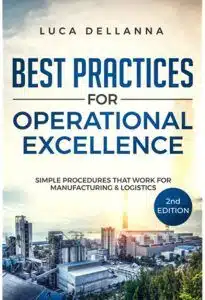
Best Practices for Operational Excellence tops the list of production and operations management books. In this resource, Luca Dellanna explains the four principles of operational excellence that determine whether companies can operate smoothly. In addition, readers will get insights on best operational excellence practices for managers and tips on getting top-management buy-in. Dellanna also includes specific suggestions on weekly meeting agendas, management walks, and the creation of standard operating principles. Other operation management insights in Best Practices for Operational Excellence include tips on implementing change in large organizations and managing multiple projects.
Notable Quote: ”The more the manager takes ‘easy choices’ by sacrificing clarity, fairness or consistency, the more his subordinates will take ‘easy choices’ themselves by sacrificing performance, quality and teamwork.”
Read Best Practices for Operational Excellence.
2. Management: Tasks, Responsibilities, Practices by Peter F. Drucker
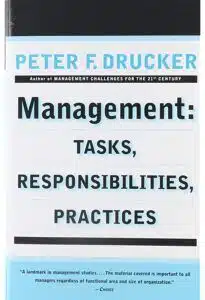
In Management: Tasks, Responsibilities, Practices, Peter F. Drucker teaches managers the vital skills to carry out their duties. The author uses his experience in teaching management in universities and seminars and his work with government agencies, small businesses, and managers. As a result, operations managers can learn successful practices that ease business processes.
Notable Quote: ”Leadership is not magnetic personality, that can just as well be a glib tongue. It is not ‘making friends and influencing people’, that is flattery. Leadership is lifting a person’s vision to higher sights, the raising of a person’s performance to a higher standard, the building of a personality beyond its normal limitations.”
Read Management.
Get our free team building toolbox
- icebreaker games
- bingo cards
- DIY guides
 by teams at FedEx, Amazon, Deloitte and 73,930+ others
by teams at FedEx, Amazon, Deloitte and 73,930+ others

3. The Toyota Way: 14 Management Principles from the World’s Greatest Manufacturer by Jeffrey Liker
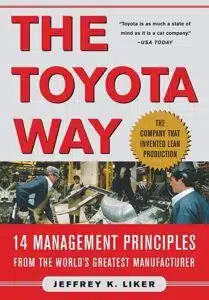
If you are looking for books on operations and supply chain management, then The Toyota Way is a great pick. Jeffrey Liker outlines simple strategies businesses can use to improve quality, speed up business operation processes, and cut costs.
Some of the lessons in the book include:
- Building quality workplace systems
- Low-cost business alternatives to expensive technology
- Making each employee a quality control inspector
- Creating continuous processes that will expose problems
- Elimination of huge business costs
- Customer satisfaction strategies
The author bases the lessons on his research on Toyota, a leading global car manufacturing company.
Notable Quote: ”We have to change the culture from one in which people simply do their own job in their own function to make their own numbers look good (a vertical focus) to one in which people are focused horizontally on the customer and on improving value streams that deliver value across functions.”
Read The Toyota Way.
4. Managing the Non-Profit Organization: Principles and Practices by Peter F. Drucker
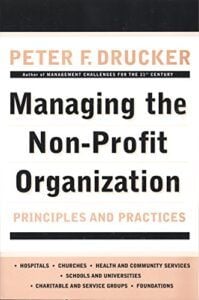
If you are looking for operations management books for nonprofits or the service sector, then Managing the Non-Profit Organization is a great option. In the book, the author uses explanations and examples of leadership, mission, marketing, people development, and goals to instill operations management skills. Drucker also includes interviews with nine experts to address issues in the nonprofit sector.
Notable Quote: ”The ‘non-profit’ institution neither supplies goods or services not controls. Its ‘product’ is neither a pair of shoes nor an effective regulation. Its product is a changed human being. The non-profit institutions are human-change agents. Their ‘product’ is a cured patient, a child that learns, a young man or woman grown into a self-respecting adult; a changed human life altogether.”
Read Managing the Non-Profit Organization.
5. Getting Things Done: The Art of Stress-Free Productivity by David Allen

David Allen’s Getting Things Done is one of the best operations management books for beginners. As a management consultant and veteran coach, the author shares effective methods for stress-free performance. Allen compares productivity with the ability to relax. The author then argues that individuals can be more productive when their thoughts are clear and organized. The author also outlines project planning, goal reassessment, and delegation tips. Getting Things Done can be a handy guide for individuals wanting to transform their work without wearing themselves down.
Notable Quote: ”Everything you’ve told yourself you ought to do, your mind thinks you should do right now. Frankly, as soon add you have two things to do stored in your RAM, you’ve generated personal failure, because you can’t do two things at the same time. This produces an all-pervasive stress factor whose source can’t be pin-pointed.”
Read Getting Things Done.
6. Building a Second Brain: A Proven Method to Organize Your Digital Life and Unlock Your Creative Potential Kindle Edition by Tiago Forte
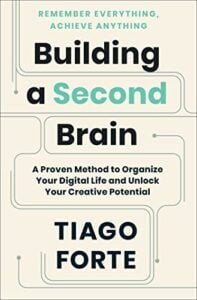
Building a Second Brain is a great choice of operations management books. The author uses a revolutionary approach to create flow and increase the ability to capture, remember, and benefit from the information. The book offers a guide on how individuals can create personal systems renowned as the Second Brain. As a result, readers discover their ideas’ full potential and use the knowledge to improve work and life aspects.
Notable Quote: ”If you can’t locate a piece of information quickly, in a format that’s convenient and ready to be put to use, then you might as well not have it at all. Our most scarce resource is time, which means we need to prioritize our ability to quickly rediscover the ideas that we already have in our Second Brain.”
Read Building a Second Brain.
7. The Checklist Manifesto: How to Get Things Right by Atul Gawande
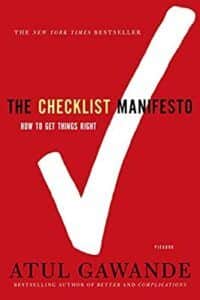
The Checklist Manifesto is a great resource for individuals who wants to learn how to simplify operations. The book features a simple guide that reinforces the importance of checklists in all businesses. The author explains why checklists affect immediate improvements, even in dire situations. Readers can use the book to learn how to use the checklist strategy in fields such as disaster response, construction, medicine, and investment banking.
Notable Quote: ”Good checklists, on the other hand are precise. They are efficient, to the point, and easy to use even in the most difficult situations. They do not try to spell out everything—a checklist cannot fly a plane. Instead, they provide reminders of only the most critical and important steps—the ones that even the highly skilled professional using them could miss. Good checklists are, above all, practical.”
Read The Checklist Manifesto.
8. Systemantics: How Systems Work and Especially How They Fail by John Gall
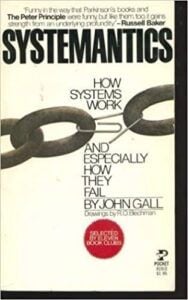
As a renowned author, John Gall uses wit and his personal experience to explain why some systems work and others fail. The author advocates for a mindset of skepticism and deep humility when dealing with all systems. Gall breaks the resource into small chapters that are easy to comprehend. Systemantics is an essential read for every individual who wants to develop a systems-thinking mindset and use the lessons to improve their operations. Systemantics is also a great choice of books on operations and supply chain management.
Notable Quote: ”Success is largely a matter of Avoiding the Most Likely Ways to Fail, and since every Bug advances us significantly along that path, we may hearken back to the advice given in the Preface and urge the following Policy: CHERISH YOUR BUGS. STUDY THEM.”
Read Systemantics.
9. Origin of Wealth: Evolution, Complexity, and the Radical Remaking of Economics by Eric D. Beinhocker
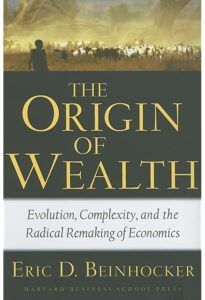
In The Origin of Wealth, Eric D. Beinhocker explains strategies to increase wealth to benefit businesses, individuals, and society. The book takes readers through economic history, highlighting complex issues in operations. For instance, readers will get insights into creating adaptive organizations and new perspectives on government policies. The book also explains the portfolio approach and the right organizational hierarchy that is vital for smooth operations. Readers can also grasp operations management tips from the author’s vast experience in sectors such as financial systems, economic inequality, environmental sustainability, and innovation.
Notable Quote: ”Hierarchies are critical in enabling networks to reach larger sizes before diseconomies of scale set in. This is why so many networks in the natural and computer worlds are structured as networks within networks.”
Read Origin of Wealth.
10. High Output Management by Andrew S. Grove
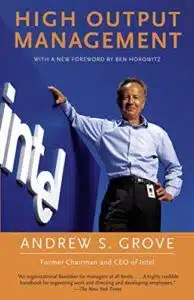
High Output Management is a fantastic resource for individuals who want to learn business creation and maintenance skills. In the book, Andrew S. Grove discusses the art of creating a successful enterprise. The former CEO of Intel shares strategies that organizations can use to navigate real-life business scenarios, create productive teams, and motivate workers for peak performance. The author also provides powerful management tips that can change how organizations work. High Output Management is a great read for startup founders, consultants, managers, and CEOs.
Notable Quote: ”Here I’d like to introduce the concept of leverage, which is the output generated by a specific type of work activity. An activity with high leverage will generate a high level of output; an activity with low leverage, a low level of output.”
Read High Output Management.
11. Work the System: The Simple Mechanics of Making More and Working Less by Sam Carpenter
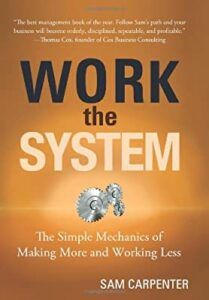
With a business management, construction, and engineering background, Sam Carpenter uses his experience to teach readers operations skills. The author offers a simple methodology that will show business owners and managers how to achieve results by looking at their enterprise on a micro level. Readers will get tips on refining internal sub-systems and changing systems to maximize profits, develop teams, and foster client loyalty. These strategies will help organizations improve performance through better management and operation systems.
Notable Quote: ”Problems are gifts that inspire us to action. A problem prompts the act of creating or improving a system or procedure. We don’t want setbacks, but when one occurs we think, ‘thank you for this wake-up call,’ and take assertive system-improvement action to prevent the setback from happening again.”
Read Work the System.
12. The 80/20 Principle, Third Edition: The Secret to Achieving More with Less by Richard Koch
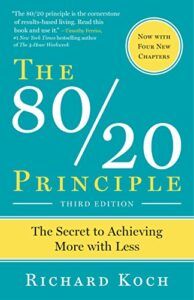
The 80/20 Principle is a great resource for individuals searching for production and operations management books. In the publication, readers will learn how to be more effective by identifying and leveraging the 80/20 rule. The principle states that 80% of business results come from 20% of the effort. Richard Koch elaborates on how businesspeople can achieve more with less time, effort, and resources. The key is identifying and focusing on the 20% that counts. The author shows workers how to apply the 80/20 principle to transform and multiply organizational effectiveness.
Notable Quote: ”80 percent of products, or customers or employees, are only contributing 20 percent of profits; that there is great waste; that the most powerful resources of the company are being held back by a majority of much less effective resources; that profits could be multiplied if more of the best sort of products could be sold, employees hired, or customers attracted (or convinced to buy more from the firm).”
Read The 80/20 Principle.
13. Images of Organization by Gareth Morgan
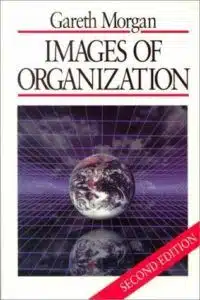
As a classic publication in management literature, Images of Organization is a fantastic option for organizational leaders. The resource bases its strategies on simple theories of management and organization that stretch readers’ imaginations. In the book, readers will explore the daily complexities of modern international organizations that will foster creative thinking on operations.
Notable Quote: ”Contingency theorists suggest that we can best proceed by appointing ‘the right people’ to the job we have in mind, and by creating flexible authority, communications, and reward structures that will motivate them to satisfy their own needs through the achievement of organizational goals.”
Read Images of Organization.
14. Working Backwards: Insights, Stories, and Secrets from Inside Amazon by Colin Bryar & Bill Carr
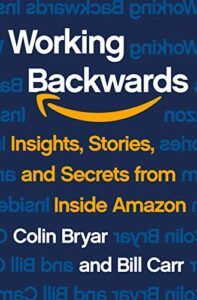
Working Backwards is an excellent read that offers readers operations management insights from Amazon, a global e-commerce company. Long-serving Amazon executives Colin Bryan and Bill Carr discuss the practices and principles that drive the company’s success. The book highlights Amazon’s leadership, approach to culture, and practices that leaders can apply in their organizations. The publication focuses on customer obsessions, operational excellence, long-term thinking, and leadership principles. The two authors reinstate the importance of rigorous practices and principles for the success of any business.
Notable Quote: ”When you encounter a problem, the probability you’re actually looking at the actual root cause of the problem in the initial 24 hours is pretty close to zero, because it turns out that behind every issue there’s a very interesting story.”
Read Working Backwards.
15. Reengineering the Corporation: A Manifesto for Business Revolution by Michael Hammer and James Champy
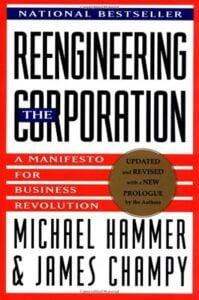
Reengineering the Corporation focuses on achieving drastic business performance improvements. Throughout the book, readers will learn the importance of radically redesigning an organization’s processes and culture to achieve sustainable results. The book promises to help corporations raise customer satisfaction and scale.
Notable Quote: ”Reengineering posits a radical new principle: that the design of work must be based not on hierarchical management and the specialization of labor but on end-to-end processes and the creation of value for the customer.”
Read Reengineering the Corporation.
16. The Six Sigma Way: How to Maximize the Impact of Your Change and Improvement Efforts by Peter Pande, Robert Neuman, & Roland Cavanagh
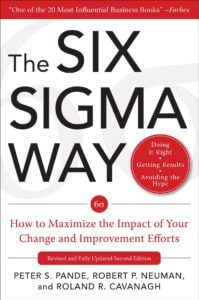
As one of the first books to explain Six Sigma’s approach, The Six Sigma Way is a great read for business managers and leaders. The book reveals the use of Six Sigma by companies such as Motorola to fine-tune processes and products. Through these strategies, organizations can reduce costs, improve performance, and increase profits. In the new edition, the authors also include practical implementation guides and case studies from companies such as Starwood, Macy’s, and Adobe.
Notable Quote: ”In a larger business context, an example of the ‘Genius of the And’ would be a company’s constant attention to both long-term growth and quarterly results.”
Read The Six Sigma Way.
17. The Innovator’s Dilemma: When New Technologies Cause Great Firms to Fail by Clayton M. Christensen
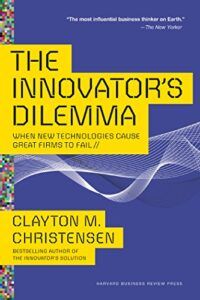
The Innovator’s Dilemma provides guidelines for organizations that want to capitalize on new technologies. The author supports innovative organizations and leaders by offering a guide based on the failures and successes of leading companies. The book also shows how renowned organizations fail despite having the best leadership. Readers will learn when to abandon traditional practices and use more innovative ideas.
Notable Quote: ”An organization’s capabilities reside in two places. The first is in its processes—the methods by which people have learned to transform inputs of labor, energy, materials, information, cash, and technology into outputs of higher value. The second is in the organization’s values, which are the criteria that managers and employees in the organization use when making prioritization decisions.”
Read The Innovator’s Dilemma.
Conclusion
Operations management is the glue that holds together all business aspects, including products, finance, workforce, sales, and marketing. Businesses with streamlined operations also get a competitive advantage in comparison to competitors. Thus, companies and operations managers must invest in improving operations management. You can browse our list of books and boost your operations management skills.
Next, check out our list of startup books, books for new managers, time management books, and growth hacking books.




